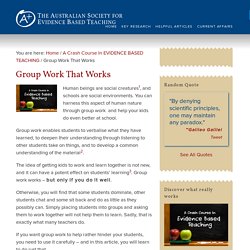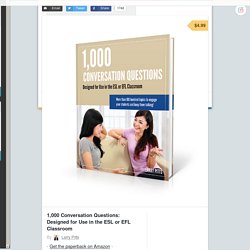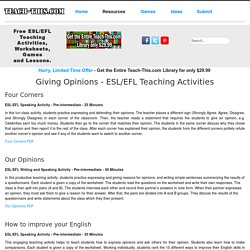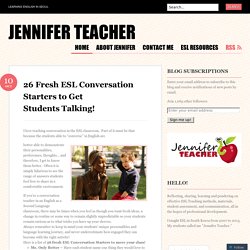

Conversation Questions for the ESL/EFL Classroom. If this is your first time here, then read the Teacher's Guide to Using These PagesIf you can think of a good question for any list, please send it to us. Home | Articles | Lessons | Techniques | Questions | Games | Jokes | Things for Teachers | Links | Activities for ESL Students Would you like to help? If you can think of a good question for any list, please send it to us. If you would like to suggest another topic, please send it and a set of questions to begin the topic. Copyright © 1997-2010 by The Internet TESL Journal Pages from this site should not be put online elsewhere.Permission is not required to link directly to any page on our site as long as you do not trap the page inside a frame. How to Use Group Work to Boost Student Results. Human beings are social creatures1, and schools are social environments.

You can harness this aspect of human nature through group work and help your kids do even better at school. Group work enables students to verbalise what they have learned, to deepen their understanding through listening to other students take on things, and to develop a common understanding of the material2. The idea of getting kids to work and learn together is not new, and it can have a potent effect on students’ learning3. Group work works – but only if you do it well. Otherwise, you will find that some students dominate, other students chat and some sit back and do as little as they possibly can. 1,000 Conversation Questions: Designed for Use in the ESL or EFL Classroom. One book.

One hundred topics. One thousand questions. Your lesson planning is about to get a lot easier. This is a teaching resource book you’ll keep coming back to again and again. Is this book for me? Do you teach high school, university, or adult students? If you answered yes to the above questions, then congratulations you are about to spend less time on your lessons. How can it save me time? Need a warm up activity to get students engaged in a topic? - Boom, done. Need an extra activity just in case you don’t have enough material? - No problem.
Giving Opinions. Four Corners ESL/EFL Speaking Activity - Pre-intermediate - 25 Minutes In this fun class activity, students practice expressing and defending their opinions.

The teacher places a different sign (Strongly Agree, Agree, Disagree, and Strongly Disagree) in each corner of the classroom. Then, the teacher reads a statement that requires the students to give an opinion, e.g. Celebrities earn too much money. Four Corners.PDF Our Opinions ESL/EFL Writing and Speaking Activity - Pre-intermediate - 40 Minutes In this productive teaching activity, students practice expressing and giving reasons for opinions, and writing simple sentences summarizing the results of a questionnaire. Our Opinions.PDF. 26 Fresh ESL Conversation Starters to Get Students Talking! 10 Oct I love teaching conversation in the ESL classroom.

Part of it must be that because the students able to “converse” in English are better able to demonstrate their personalities, preferences, thoughts… and therefore, I get to know them better. Often it is simply hilarious to see the range of answers students feel free to share in a comfortable environment. If you’re a conversation teacher in an English as a Second Language classroom, there may be times when you feel as though you want fresh ideas, a change in routine or some way to remain slightly unpredictable so your students remain curious as to what tricks you have up your sleeves. Always remember to keep in mind your students’ unique personalities and language learning journey, and never underestimate how engaged they can become with the right activity! Here is a list of 26 fresh ESL Conversation Starters to move your class! Enjoy! Like this: Like Loading... Tags: conversation, Lesson Planning, speaking. Speaking and icebreaker activities for ESL Teachers:eslflow webguide.
Daily ESL: Conversation Starters for English Students. ESL Discussions: English Conversation Questions / Debates: Speaking Lesson Activities. Conversation Questions for the ESL/EFL Classroom.